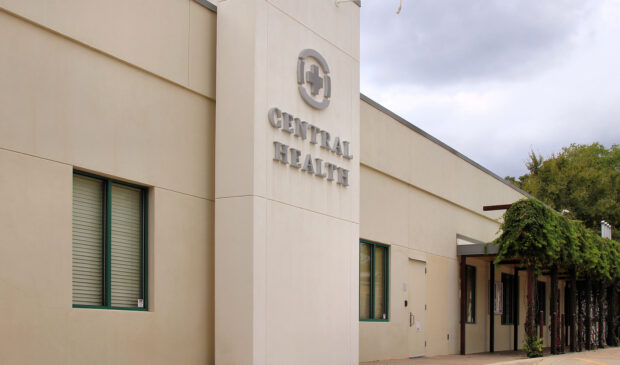Judge considering lawsuit against Central Health
Friday, May 10, 2024 by
Jo Clifton After hearing about two hours of arguments on Thursday, Travis County District Judge Amy Clark Meachum told attorneys for Travis County’s health care district and the three taxpayers who are suing Central Health, over its use of $35 million per year in taxpayer money that she would take their arguments under advisement. She directed both sides to prepare orders for her to sign.
Plaintiffs Rebecca Birch, Richard Franklin III and Esther Govea filed suit in 2017, claiming that Central Health is not authorized to pay the University of Texas’ Dell Medical School any money that does not directly go to providing health care for Travis County’s low-income residents.
Attorneys for Central Health first argued that the plaintiffs did not have standing to sue and that they are improperly seeking to control Central Health’s statutorily authorized spending authority. Attorney Sinéad O’Carroll told the court that governmental immunity should bar the plaintiffs’ claims and that any powers not specifically spelled out in state law could still be implied by the proposition voters approved in 2012.
Meachum said she was not ready to rule on the standing question and noted that previous decisions on standing by herself and other Travis County judges had been rejected by the 3rd Court of Appeals. She directed O’Carroll to go ahead with arguments that would result in a summary judgment for the defendants. She also told the parties that she did not have “the power to right any political wrong.”
Attorneys Manuel Quinto-Pozos and Fred Lewis argued on behalf of the plaintiffs. Both noted that there had been efforts to implement audits of the $35 million per year paid to the Dell Medical School. Those efforts have not been entirely fruitful, Quinto-Pozos said. Nor had efforts with the Texas Legislature. He compared Central Health to a college student who got a credit card for a few restricted purposes but used it for all kinds of things.
Quinto-Pozos and Lewis said only 10 percent of what Central Health gives to UT’s medical school is for clinical uses – in other words, to treat patients. The remainder is used for medical education, research and other nonmedical uses. Lewis noted that the medical school donated $250,000 to the Downtown Innovation District, a Downtown Austin Alliance project.
Other expenditures include donations to charitable organizations, Lewis said. “This is not about politics. This is about whether Central Health … has the authority to fund a medical school. … Nobody defines medical care as education.”
O’Carroll argued to the contrary, saying that all the things that the Dell Medical School does in order to bring more doctors to Austin, for example, are in direct support of medical care. For example, she said, the medical school has been able to set up a special clinic for people with spinal and other skeletal problems. Before they were able to do that, there was a lengthy waiting list for people waiting to see a doctor for those conditions.
Lewis told the Austin Monitor he was happy for the plaintiffs to have had their day in court. The side of the courtroom behind the table occupied by Lewis and Quinto-Pozos had a variety of interested citizens, indicating that people have been following the case.
“Central Health is pleased to have had the opportunity to present our case today in court. It is time to bring this lawsuit to a close and focus on advancing the well-being of our community and, most importantly, our patients,” said Ted Burton, spokesperson for Central Health.
“Twelve years ago, Travis County voters overwhelmingly voted to support the establishment of a medical school in Austin. Our community recognizes that modern health care extends far beyond brief doctor’s appointments. To create an inclusive, effective health care system that caters to the needs of individuals with low incomes, we must prioritize prompt referrals to specialist care, innovative Alzheimer’s research, cutting-edge cancer care and top-tier physician training. Central Health’s partnership with the Dell Medical School means we can better serve Travis County residents who would not otherwise have access to health care.”
Photo by Larry D. Moore, CC BY-SA 4.0, Link.
The Austin Monitor’s work is made possible by donations from the community. Though our reporting covers donors from time to time, we are careful to keep business and editorial efforts separate while maintaining transparency. A complete list of donors is available here, and our code of ethics is explained here.
You're a community leader
And we’re honored you look to us for serious, in-depth news. You know a strong community needs local and dedicated watchdog reporting. We’re here for you and that won’t change. Now will you take the powerful next step and support our nonprofit news organization?










